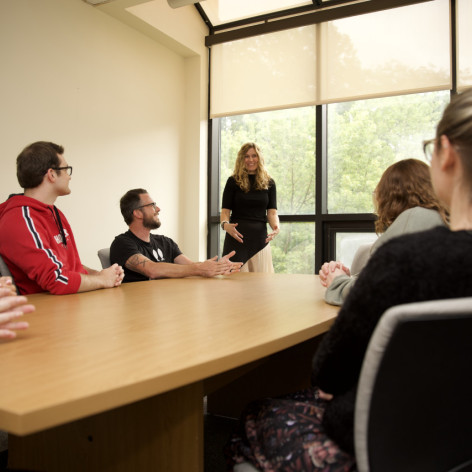Biologist questions PBS’s Darwinian dogma
FOR RELEASE: Thursday, January 10, 2002
Huntington, Ind. " Keep an open mind about things and draw your conclusions only when you have a good grasp of all sides of the issue, says Dr. Bruce Evans, associate professor of biology at Huntington College. Evans will appear as a panelist on WFWA-TV Sunday afternoon (January 13) to respond to the widely publicized PBS series, Evolution. While Evans appreciates the science presented in the program, he questions some of the conclusions it reaches. PBS has gone to great lengths to produce a series promoting the tenets of Darwinism and the evolution of life on this planet. This is a worthy goal, because I think that anyone who wants to think about origins needs to strongly consider the claims of evolutionary theory, he says. However, it appears that the producers of this series have let their preconceived notions about the validity of evolution taint their presentation of the facts.
Evans will be among three panelists to discuss the program Sunday afternoon on WFWA TV-39. The roundtable program will begin at 6:30 p.m., immediately following the second installment of the nationally broadcast Evolution miniseries.
If we are to truly seek the truth concerning origins, then we should objectively consider all the evidence and see what conclusions we can make from it, says Evans. That attitude should not only guide research, Evans believes, but also science instruction.
In a recent poll taken by Channel One, 83% of respondents suggested either that creationism alone or creation and evolution together should be taught in our schools. This is just a poll, but it indicates that at least some folks want to see evidence for all sides of an issue.
The recently passed Education Bill suggests that we keep an open mind about origins in our schools, Evans adds.
Whether or not evolution has occurred, producers should be willing to allow folks with other views to express their thoughts in this forum. I am glad that WFWA has decided to present this roundtable discussion to at least get some different opinions regarding the series.
I see this approach as the only way to arrive at the truth. Keep an open mind about things and draw your conclusions only when you have a good grasp of all sides of the issue.
Evans earned his Bachelors degree in biology from the University of Charleston (West Virginia) in 1985, and then went on to obtain a Ph.D. in neurobiology in 1991 from Emory University in Atlanta (Georgia). Dr. Evans has also studied at the Marine Biological Laboratories in Woods Hole, Mass., exploring on the neural basis of behavior. Dr. Evans has presented his research findings before the Society for Neuroscience and American Society of Zoologists. He has published research articles in Peptides, Cell and Tissue Research, and Journal of Experimental Biology. Evans is a member of the Indiana Academy of Science and past-president of the Indiana College Biology Teachers Association.
Since joining the faculty at Huntington in 1991, Dr. Evans has spent considerable time learning about dinosaurs in various parts of the U.S. In 2000, Evans spent a week in central Texas with renowned dinosaur footprint expert Dr. James Farlow, investigating several different dinosaur trackway sites. Prior to that, he has studied dinosaurs in Colorado and Utah as well as at the State University of New York at Stony Brook.
Dr. Evans is also interested in the emerging field of Intelligent Design Theory and attended the Nature of Nature conference at Baylor University as well as a major design conference at Yale in 2000.
Huntington College is comprehensive Christian college of the liberal arts offering graduate and undergraduate programs in more than 50 academic concentrations. US News and World Report ranks Huntington among the best in the Midwest. Founded in 1897 by the Church of the United Brethren in Christ, Huntington College is located on a contemporary, lakeside campus in Huntington, Indiana.



